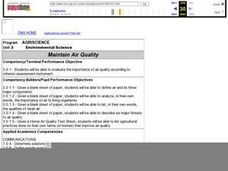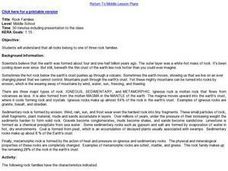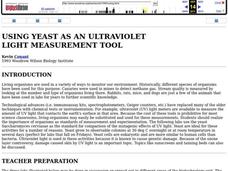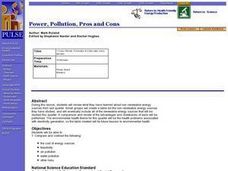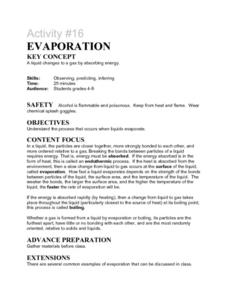Curated OER
Leaking Underground/ Storage Tanks
Young scholars engage in a instructional activity that is about the concept of storage tanks and how they are used. The advantages and disadvantages of them is discussed with the facts given by the teacher during lecture and concurrent...
Curated OER
Maintain Air Quality
Students are engaged in discussing air quality through hands-on demonstrations using balloons, sealed jars, and toy cars. Students conduct a home radon test to measure their air quality.
Curated OER
Rock Families
Young scholars study the three types of rock characteristics; igneous, sedimentary, and metamorphic. They are divided into three groups and each group takes one of the rock characteristics. They then act out the characteristics of...
Curated OER
Wetlands Project
Young scholars discover how wetlands filter out contaminants before they can reach other bodies of water. In groups, they design and build a model of a stormwater wetland. They test the water quality and inform their classmates about...
Curated OER
The Breathtaking Nature of the Urban Explosion, Part 4
Students explore the respiratory system. They use a computer to monitor the respiratory rate of an individual. They determine residual oxygen levels in exhaled air. Students evaluate how internal 02 and C02 concentrations influence...
Curated OER
Using A Winogradsky Column to Analyze Microbial Communities
Students use easily obtained materials to study ecological succession in a microbiological community. They collect water samples from outdoor sources in plastic bottles to observe and record changes.
Curated OER
What Does Your "Homunculus" Look Like?
Students determine the density of touch receptors in various parts of the body on the right hand side. They use collected data to draw a picture of the
"homunculus" of an experimental subject.
Curated OER
Ethical Decision Making in Biology
Students explore a model that illustrates the spread of HIV through an adolescent population. Acting in the role of epidemiologists, students explore the dilemmas of HIV infection presented by a simulation. Students produce a play, skit,...
Curated OER
Using Yeast as an Ultraviolet Light Measurement Tool
Students accurately measure the relationship between radiation dose and either survival or some genetic event such as mutation or recombination. They investigate the damage that was done to the DNA molecule as a result of exposure to...
Curated OER
Making Paper
Students explore how natural earth materials are processed into a human-made product. They simulate a manufacturing process by making paper. Students review the importance of recycling in preserving our natural earth resources.
Curated OER
Power, Pollution, Pros and Cons
Students review what they know about non-renewable energy, compare and contrast advantages and drawbacks of each type, such as cost of energy sources, feasibility, air pollution, water pollution, and other risks, and create table listing...
Curated OER
Silent Spring
Students read background information about Rachel Carson found on the listed website links. They analyze and answer questions about her work and how it is linked to science then they research pesticide usage and alternative methods.
Curated OER
Birds of Different Feathers: Species Specialization
Students identify differences in bird species and explain the concept of species specialization. They attain the knowledge that different birds occupy different habitats.
Students identify characteristics and features of birds that make...
Curated OER
Evaporation of Alcohol and Water
Students investigate the process that occurs when liquids evaporaate. They test water and alcohol to determine which substance evaporates more quickly and relate the rate to energy changes.
Curated OER
How Big is a Crowd?
Sixth graders compare the relative sizes of the five Great Lakes and their human populations. They describe some of the problems that arise when many people depend on a limited resoure. Students discuss how the Great Lakes and the...
Curated OER
Making Atoms
In this atoms worksheet, students determine an atoms based on its protons, and neutrons. Students determine the electron levels for the oxygen atom. This worksheet has 1 multiple choice, 4 fill in the blank, and 13 short answer questions.
Curated OER
Water and Rice Agriculture
Second graders investigate the agriculture of rice by reading a study guide. In this food making lesson, 2nd graders read about the irrigation of rice fields used for harvesting. Students write three sentences about the rice irrigation...
Curated OER
Pheed the World: Edible Phyla
Students discuss the contributions of different organisms to our world. In this biology lesson, students research countries with limited food supply. They create an improvement plan for a fictitious country assigned to them.
National Institutes of Health
Nih Curriculum Supplement Series: Chemicals, the Environment, and You
This comprehensive site from the Office of Science Policy offers a teacher's guide, lesson plans, and student activities that discuss the presence of chemicals in the environment and how they might affect one's body.
Other
Rensselaer Polytechnic Institute: Chemical Equilibrium
This site from the Rensselaer Polytechnic Institute provides an introduction to chemical equilibrium, covering equilibrium expressions, the pH scale, and presenting how to plot log concentration diagrams.
Other
Ithaca College: Project Look Sharp: Chemicals in the Environment
[Free Registration/Login Required] Project Look Sharp offers a unit, complete with lesson plans, PowerPoint presentations, and videos, focused on chemicals in the environment.
Country Studies US
Country Studies: Uzbekistan: Environment
This article from the Library of Congress addresses the sad state of the environment in Uzbekistan caused by chemical, water, and air pollution. Particular emphasis is focused on the Aral Sea.
Other
Pollution Probe: Mercury in the Environment [Pdf]
High levels of mercury exposure can cause birth defects, permanent brain or kidney damage, and/or death. This resource focuses on the impacts of mercury in the environment. Learn how mercury can reap havoc on lakes and other aquatic...
Biotechnology Institute
Biotechnology Institute: Your World: Health Care, Agriculture, Environment [Pdf]
Take a closer look at some of the ways in which biotechnology is applied to help solve medical issues and improve our environment.



